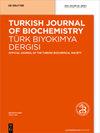Effects of resveratrol on Oxidant and Antioxidant Systems in Model of Rat Metabolic Syndrome
IF 0.7
4区 生物学
Q4 BIOCHEMISTRY & MOLECULAR BIOLOGY
Turkish Journal of Biochemistry-turk Biyokimya Dergisi
Pub Date : 2014-01-01
DOI:10.5505/TJB.2014.58569
引用次数: 1
Abstract
Objective: In recent years, metabolic syndrome, which is a serious health problem, enhancing the effect of oxidative stress and lipid peroxidation, which is a natural antioxidant resveratrol, a polyphenol structure, the use of this area has brought. The present study aimed to evaluate the influence of resveratrol (RSV) treatment on heart, kidney and hepatic tissue malondialdehyde (MDA), nitric oxide (NO), superoxide dismutase (SOD) and catalase (CAT) levels in high fructose feeding rats which form an experimental metabolic syndrome model and compared to pre-treatment of metabolic syndrome group and the control group values. Methods: Wistar/albino rats (n=15) were used in the present study. Rats were divided equally into 3 groups as control, created group of metabolic syndrome and metabolic syndrome plus resveratrol treatment. At the end of the experimental period, tissue MDA, NO, SOD and CAT levels were studied manual spectrophotometric methods after homogenization of tissues. Results: The result of the study, a significant increase in heart and liver tissue MDA levels, and heart, kidney, liver tissue NO levels were observed in the metabolic syndrome group compared to the controls (p<0.05), following treatment with resveratrol significantly decreases were observed to be close to the control values. Kidney and liver tissue catalase activity statistically significant decrease in metabolic syndrome group compared to the controls, (p=0.019 and p=0.021, respectively), kidney and liver tissue catalase activity similar to control values after treatment with resveratrol, a significant increase was observed (p=0.011 and p=0.58), but changes in the activity of SOD has not been as significant as catalase (p>0.05). However, hepatic SOD activity of resveratrol treatment group compared with the control group, a significant increase was recorded in the treated group (p=0.011). Conclusion: These results suggest probably antioxidant effects of resveratrol to reduce oxidative stress in the liver and kidney tissue which is an important role in metabolism. Against tissue damage generated by exogenous fructose, resveratrol is effective in preventing tissue damage with a direct or indirect effect shows.白藜芦醇对大鼠代谢综合征模型氧化和抗氧化系统的影响
目的:近年来,代谢综合征这一严重的健康问题,增强了氧化应激和脂质过氧化的作用,其中白藜芦醇是一种天然抗氧化剂,具有多酚结构,这一领域的应用已经带来。本研究旨在评价白藜芦醇(resveratrol, RSV)处理对形成实验性代谢综合征模型的高果糖喂养大鼠心脏、肾脏和肝脏组织丙二醛(MDA)、一氧化氮(NO)、超氧化物歧化酶(SOD)和过氧化氢酶(CAT)水平的影响,并与代谢综合征治疗前组和对照组的数值进行比较。方法:采用Wistar/白化大鼠15只。将大鼠平均分为3组,分别作为对照组、代谢综合征组和代谢综合征加白藜芦醇治疗组。实验结束时,组织匀浆后,采用手工分光光度法测定组织中MDA、NO、SOD和CAT水平。结果:研究结果:代谢综合征组与对照组相比,心、肝组织MDA水平及心、肾、肝组织NO水平均显著升高(p0.05)。而白藜芦醇治疗组肝脏SOD活性较对照组显著升高(p=0.011)。结论:白藜芦醇可能具有降低肝脏和肾脏组织氧化应激的抗氧化作用,在机体代谢中起重要作用。对于外源性果糖引起的组织损伤,白藜芦醇具有直接或间接的预防作用。
本文章由计算机程序翻译,如有差异,请以英文原文为准。
求助全文
约1分钟内获得全文
求助全文
来源期刊
CiteScore
1.20
自引率
0.00%
发文量
0
审稿时长
6-12 weeks
期刊介绍:
Turkish Journal of Biochemistry (TJB), official journal of Turkish Biochemical Society, is issued electronically every 2 months. The main aim of the journal is to support the research and publishing culture by ensuring that every published manuscript has an added value and thus providing international acceptance of the “readability” of the manuscripts published in the journal.

 求助内容:
求助内容: 应助结果提醒方式:
应助结果提醒方式:


